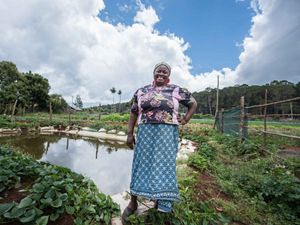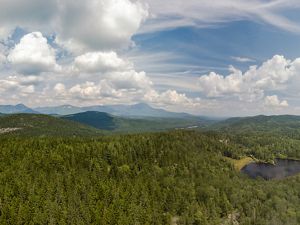Protecting Clean Water, Naturally
Collaborating to ensure pure drinking water stays that way.
On a hot summer day, families splash in the cool, sandy shallows of a campground beach at Sebago Lake State Park. A small procession of ducks paddles in and out from the rocky fringes, heads furiously bobbing along the water's surface in search of food. An occasional canoe or kayak slowly passes just beyond the swim area rope as power boats speed by further in the distance. It's a typical lakeside scene in Maine, but this is not a typical lake.
This is Sebago Lake, an enormous 28,771-acre, 316-feet-deep body of water—the second largest in the state, behind only Moosehead. Located just northwest of Portland, Sebago is also the source of clean, safe drinking water to one in six Mainers. It is one of only 50 water supplies in the United States so pure that it needs no filtration before treatment.
How is that possible? It's thanks to the forests that cover 84% of the land that drains into the lake, which provide perfect natural filtration. These forests filter rainfall, removing sediments and pollutants before slowly releasing water into streams and rivers that feed the lake. Additionally, tree roots hold soil in place on stream, river and lake banks, helping to prevent erosion of potentially damaging sediment into the water.
Quote
According to the U.S. Forest Service, this is the most vulnerable watershed in the Northeast.
Sebago Lake and the surrounding forests form a remarkable natural water-cleaning system. There’s just one problem: Only 10% of these forests are permanently conserved. According to the U.S. Forest Service, this is the most vulnerable watershed in the Northeast.
A Water Fund Conserves Forests to Protect Clean Water
The Nature Conservancy in Maine is joining with partners to secure the future of these forests and the clean water on which so many depend. TNC has teamed up with local land trusts, the Portland Water District, and other NGOs to form Sebago Clean Waters (SCW), a partnership dedicated to conserving an additional 35,000 acres of priority forest land in the next 15 years. In order to accomplish this, the group is also building a $15 million water fund to bring new funding to support this vital conservation work.
A water fund is a financial vehicle that allows water users to invest in upstream forest conservation to maintain a pure water supply. While most communities must rely on treatment plants to meet their water security needs, it is better—and more cost effective—to protect water at its source.

Tamara Lee Pinard, community initiatives manager for TNC in Maine and TNC's lead in this work, explains that building relationships and trust is critical for a successful water fund.
"Our business partnership advisor has led SCW in developing an understanding of the needs of businesses who are an integral part of launching a water fund. As relationships within SCW and with the business community grow, SCW can capitalize on the strengths of partners to accelerate the pace of forestland protection."
Currently, The Nature Conservancy is developing 35 water funds in 12 countries and manages a water fund network that offers information and resources for emerging projects. That experience has helped provide significant leadership, support and knowledge to the SCW partnership.
Seeing Success
Today, our efforts are paying off: the coalition has hired a coordinator and business partnership advisor, created outreach materials, and commissioned an economic impact study to better understand how area businesses can engage in the fund. Local breweries have been early supporters of this innovative land and water conservation effort, with Allagash Brewing and Rising Tide Brewing both pledging to donate ten cents for every barrel of beer they brew.
And recently, an SCW partner, Loon Echo Land Trust, secured 1,400 acres for a community forest in the town of Sebago with help from the Trust for Public Land, the Portland Water District, The Nature Conservancy, Open Space Institute and others. This was the first project to capitalize on the strength of the SCW partnership to make it happen.
"Due to TNC’s integral investments of time and resources," says Lee Pinard, " SCW is now in a position to innovate and find opportunities to bring in new funding to leverage even larger investments in this critical watershed."
For those families splashing in the cool waters at the park on a summer day, Sebago is a recreational paradise. But for so many Mainers and businesses alike, it is also their drinking water source—and a remarkably pure one. TNC, working as an integral partner of Sebago Clean Waters, intends to keep it that way.




